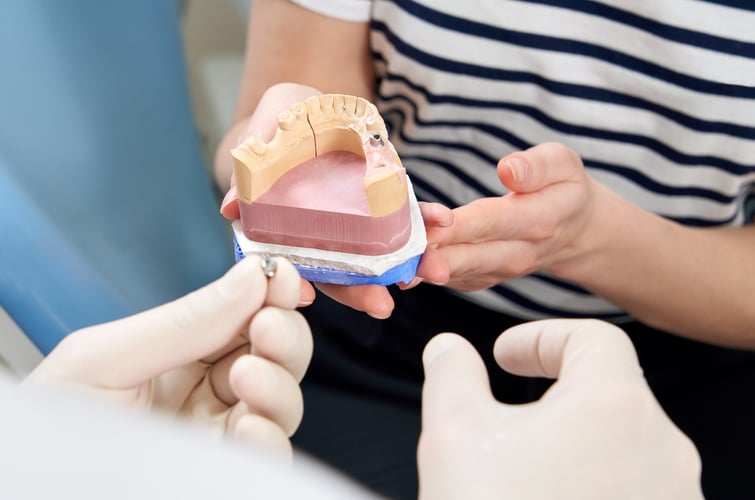Dental implants replace missing teeth, as a more permanent and comfortable solution than dental bridges or dentures. They look just like natural teeth, and are long-lasting.
Many people tend to think of the visible tooth portion, but what makes them an implant is a titanium post set right into the bone where the missing tooth roots were. It provides a secure base for the tooth replacement to attach on to. Because it is secured into the bone and should fuse with the surrounding bone, potential candidates need good bone structure. This titanium implant can then mimic the action of the roots of teeth, as a replacement, for the visible tooth part to attach to.
Table of Contents
ToggleAre Dental Implants Better Than Dentures?
Dental implants function better than dentures or other tooth replacement options, acting more like a natural tooth for better chewing. Implants preserve bone and maintain your face and jaw structure, which is one of the most critical advantages.
Missing or damaged teeth create significant issues and negatively affect overall oral health. When teeth are missing, bone tissue is not stimulated as it should be from regular chewing, leading to bone loss. The jawbone can shrink, and your face shape can change. Remaining teeth may shift, as well. Often, jaw pain, headaches, and difficulty eating and speaking are also experienced.
They are more comfortable and do not put stress on surrounding teeth. Dental implants look more natural, as well, and are easier to maintain since, unlike dentures, you simply care for them the way you do for your other teeth.
How Does A Dental Implant Work?
The dental crown is the visible “tooth” part people associate with the dental product. It is attached to the titanium implant post, using an abutment to connect the two. A dental crown can be made from porcelain, ceramic, resin, or metals such as gold, silver, alloys, or metal-fused porcelain.
The post affixes and stabilizes the dental crown so that it can be used as a natural tooth.
How Long Do Dental Implants Last If There Are No Issues?
The longevity of dental implants will be impacted by a variety of factors, such as general oral health, maintenance of good oral hygiene, the presence of pre-existing medical conditions, and more. However, there is an average lifespan that can be expected, if implants are cared for.
How Long Do Dental Implants' Titanium Rods Last?
The titanium rod that is actually implanted lasts longer, as it is fused with the surrounding bone and does not face the forces and stresses that the crowns do. The implant lasts potentially over 25 years and can be seen as a permanent solution.
How Long Do Dental Implants' Dental Crowns Last?
An abutment or dental crown faces more stresses and trauma so usually lasts a shorter period, about 10 to 15 years. This lifespan depends on the material used, whether proper care is taken, and a variety of other reasons. The location of the tooth replacement is a large influence in its lifespan, as molars and incisors tend to be used more heavily and are exposed to higher forces, so usually do not last as long.
Fortunately, crowns and abutments are more easily repaired or replaced.

Dental Crown Repair
Visible wear, chips, and discolouration of the dental crown or surrounding teeth are signs that it may need to be repaired or replaced. Regular dental checkups are also recommended to detect any potential concerns in the early stages.
How Successful Is Dental Implant Surgery?
Dental implant surgery is a low risk procedure, with a 95% success rate. However, on rare occasions, dental implant failure may occur. Dental implant failure means that the implant has not taken successfully or otherwise needs to be removed.
Dental implants can fail if the bone does not fuse with the implant successfully, or if it moves, shifts position or becomes loose. On extremely rare occasions, it may even fall out or break.
Dental implants also fail when infection sets in around the implant, causing inflammation in the tissues or gums surrounding it. Nerve damage will also result in the implant being removed. Another symptom that an implant needs to be removed is the onset of sudden sinus issues.
What Can You Do to Make Dental Implants Last Longer?
While there are some factors on how long dental implants last that you do not have much influence over, you can have an impact on the longevity of dental implants.
A key factor to the success and longevity of dental implants is the quality of the implant itself, and the skill of the dental professional putting it in. A good start is finding a reliable dentist that is current with newer dentist technology and has experience in the process, especially since implant placement is critical to the long term success of the implant. Always follow dentist recommendations regarding your dental implant surgery.
There are other actions you can take, too.
Excellent Oral Hygiene
Poor oral hygiene is associated with a shorter lifespan; taking meticulous care of all of your teeth will help. Fortunately, you can care for your implant in the same way as your other teeth.
A high level of oral hygiene is important for protecting implants, and natural teeth and gums. Regular brushing and flossing to clear bacteria and plaque is recommended to keep gums healthy and promote oral and overall health. Mouthwash may be recommended to you, too.
Medical Conditions
If you have a condition that causes chronic inflammation, following your doctor’s recommendations will help you manage your condition. Inflammation creates a higher risk for your implant failing because of instability, so managing this as best you can helps to counteract this.
Bone Density and Bone Quantity
Implants need to be able to fuse to bone, so there needs to be enough of it, and it needs to be dense enough. This is why bone quantity and quality is required when determining who is a good candidate. If a loss of bone density happens after implantation, the implant can fail. Maintaining good health and taking measures to support healthy bones, as recommended by your doctor, will help prevent this.
Grinding and Chewing
Avoid excessive chewing and using your teeth as tools. If you grind your teeth at night, get a mouth guard to protect your teeth. Heavy use of teeth like this causes premature wear and tear on dental implants and other teeth alike.
Wearing a mouth guard during sports can also help prevent physical wear and trauma.
Diet Factors
Avoid too much alcohol, and try to quit smoking, as these are detrimental to oral health and your crowns. Alcohol and tobacco weaken your immunity, so you are more vulnerable to infection which leads to a variety of dental concerns and reduces the longevity of your implant.
Eating sugary and refined foods is associated with higher plaque buildup, leading to a gum disease known as gingivitis.
Gum Disease
Peri-implantitis is a disease affecting the gum tissue around an implant, causing inflammation. It leads to bone loss, which in turn can make your implant unstable and loose. Avoiding plaque-causing foods and maintaining good hygiene practices can help prevent this.

Contact Orchard Park Dental for Dental Implants With the Appearance of Natural Teeth
Orchard Park Dental has friendly staff who can help you if you are missing teeth, with dental implant treatment. We support you throughout the process, including guiding you on proper care and answering your questions about tooth loss and the healing process. We offer sedation for anxious clients. We use dental techniques and equipment for your treatment.

After attending McMaster University to obtain his Health Science undergrad degree, Dr. Christopher Sims made his way to Toronto to complete his DDS degree at the University of Toronto. But his education didn’t stop there.
He’s completed a number of additional courses to best serve his patients and be able to educate them too. No matter your age or dental condition Dr. Sims can assist you in a professional manner and loves answering any of your questions or concerns.
Dr. Sims grew up in Grimsby playing basketball, so he’s always up for talking about the Raptors! He’s also a football fan – go Buffalo Bills! In his free time, if he’s not watching a basketball game or football game, you’ll likely find him working out, cooking (got any new recipe ideas?), and of course, spending time with his amazing family.










